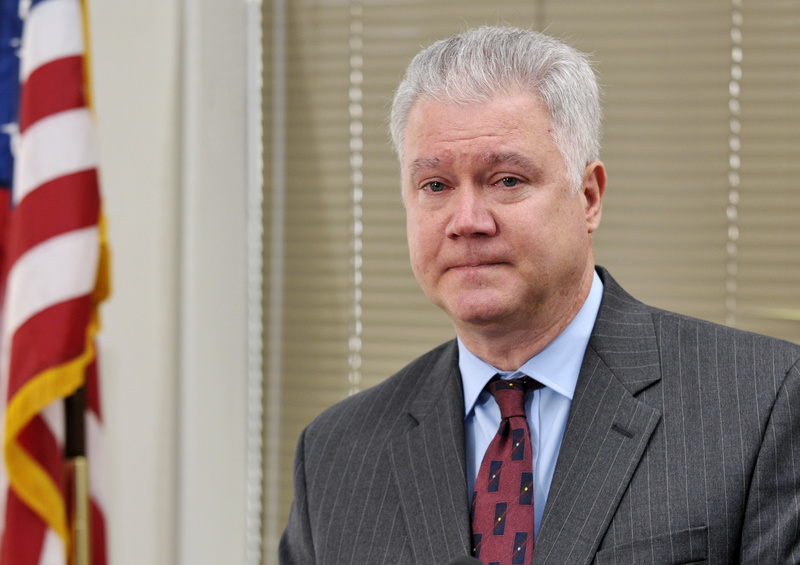Former gubernatorial candidate John Richardson was warned by the state’s ethics commission in February about problems in his fundraising operation, weeks before four campaign volunteers allegedly violated Clean Election Act rules while working on his behalf.
Jonathan Wayne, executive director of the Maine Commission on Governmental Ethics and Election Practices, said he called the Richardson campaign on Feb. 22 to alert it to a complaint about a volunteer fundraiser.
The complainant said a campaign volunteer had offered to cover a $5 qualifying contribution to Richardson, Wayne said, if the complainant certified that the donation had come from them.
Wayne did not reveal the volunteer’s name to the campaign because the person who reported it did not want to be identified, he said. That person and the volunteer know one another, Wayne said, and if the name of the volunteer had been revealed, the tipster’s identity would have been as well.
Similar, subsequent violations involving campaign volunteers caused the ethics commission to reject Richardson’s application for public funding and prompted the Brunswick Democrat’s withdrawal from the gubernatorial campaign.
The ethics commission’s findings have been turned over to the state Attorney General’s Office for investigation.
Richardson said that while he and his campaign staff appreciated being contacted about the allegation in February, not having the name of the volunteer was a problem.
Richardson thought the fact that allegations were made but an offender wasn’t identified pointed to a significant problem in the system.
“It seemed almost like a mandatory requirement to report the name to a candidate so they could take remedial action,” Richardson said. “The failure to disclose that name basically made our worst fears come true. That is that someone submitted questionable forms who the ethics commission was made aware of but failed to disclose the name to the campaign.
“At that time,” Richardson said, “we stated to (Wayne) that he put us in a very difficult position because we would divorce that volunteer from the campaign — if we knew who he was. We felt at that time that, without a name, we wouldn’t know, going forward, whether we would submit tainted forms or not.
“Ultimately, that person’s name did make it to the report. It could have been prevented, and their termination from the campaign would have sent a very serious message to the rest of the volunteers,” he said.
Wayne disagreed, noting that the issues in the campaign that led the commission to withhold funding originated after his call.
“The people who are responsible for most of the problems in the (commission) staff determination started working for the campaign in March,” Wayne said. “The significant problems are totally unrelated to this incident in mid-February. The commission staff has concerns that the Richardson campaign did not adequately train and supervise its campaign workers.”
Richardson said he and senior staff members trained everyone who was taking in donations. After hearing of the allegation in February, Richardson said, he redoubled efforts to get volunteers to follow the rules.
“I spoke loudly and often to the campaign volunteers about the proper method of collecting signatures, to the point where I began to offend people who thought I was questioning their integrity,” Richardson said.
He dropped out of the race April 26 after it was revealed that at least four volunteers had broken campaign finance rules by offering to provide qualifying contributions for the state’s clean elections program on behalf of donors.
The deadline for candidates to apply for clean election funding was April 1. The ethics commission scrutinized Richardson’s application for almost a month before rejecting his bid.
Wayne said he notified a Richardson staffer, William McKinley, on Feb. 22 about the alleged fundraising violation by a campaign volunteer. On Feb. 23, he said, Richardson called the ethics commission about another matter and asked about the allegation against the volunteer.
Wayne, in a recent interview, again refused to name the complainant. The ethics commission also has rejected Freedom of Access Act requests from MaineToday Media for documents related to Richardson’s bid for clean election funding, citing the investigation by the Attorney General’s Office.
On Thursday, MaineToday Media appealed those denials by suing in Kennebec County Superior Court.
To qualify for clean election funding, candidates for governor must collect at least 3,250 contributions of $5 each. Each contributor must certify in writing that they are, in fact, the $5 donor. Circulators who collect the contributions must certify that the donation did, in fact, come from that donor.
Three other gubernatorial candidates — Democrats Patrick McGowan and Elizabeth Mitchell and Republican Peter Mills — qualified for clean election funding. No complaints about circulators or volunteers representing those campaigns were received, according to the ethics commission.
Wayne said the Richardson campaign told the commission in February that it would send further instructions to its volunteers to ensure they followed the law with regard to the $5 contributions.
Wayne said he has not seen evidence that that happened, and most of the problems identified by the commission in its determination occurred after February.
“The campaign worker we learned about in February was a very small part of the campaign conduct discussed in the staff determination,” Wayne said. “Even if we had identified the campaign worker, I don’t have any reason to see it would have had an effect.”
Staff Writer Matt Wickenheiser can be contacted at 791-6316 or at: mwickenheiser@pressherald.com
MaineToday Media State House Reporter Susan Cover can be contacted at 620-7015 or at: scover@centralmaine.com
Send questions/comments to the editors.


